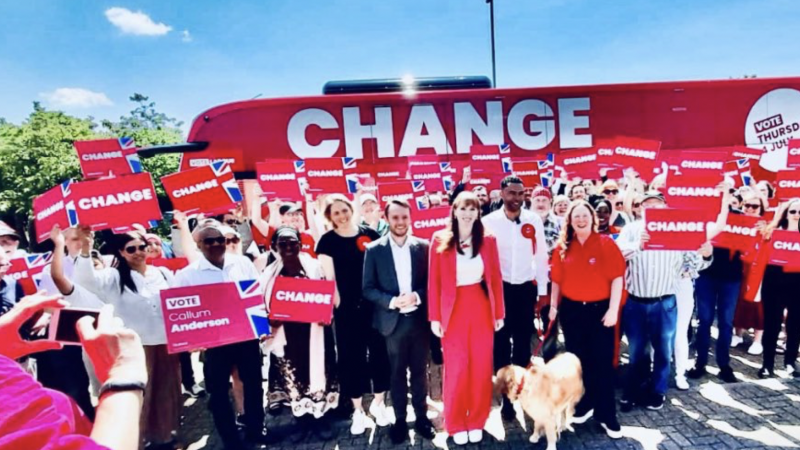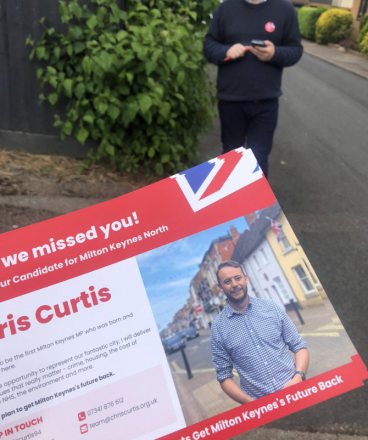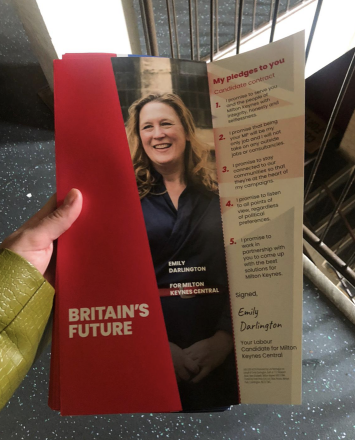
Labour is pledging to build a generation of new towns; within six months of coming to power, they have said they will set up a new towns commission. Sites will begin to be chosen within the year, as part of a commitment to build 1.5 million new homes over the next parliament, as Labour seeks to emulate the post-war building boom which saw waves of new towns chartered around the country.
The largest of these was Milton Keynes, incorporated in 1967. The city is now home to more than a quarter of a million people, and three parliamentary constituencies, up from two at the last election thanks to boundary changes.
All three are, in their current iterations, Conservative held; in their new iterations the electoral calculus poll aggregator predicts Labour will them all take on July 5. I arrive in the city on a Monday morning; Labour’s newly launched battle bus put in an appearance the day before, a sign of just how seriously the party is taking winning here.
The first MP from Milton Keynes
I start my time in Milton Keynes out on the suburban doorstep campaigning for Chris Curtis, Labour’s candidate in Milton Keynes North. Taking in the top of the city proper and the villages to the north, the constituency has been held by the Conservatives since it was first contested in current form in 2010. Since 2019 the MP has been Ben Everett, who was won at that election with a majority of 6,255 votes.
While Labour has taken seats in the area before (we held North East Milton Keynes between 1997 and 2005), it has not historically been easy terrain for Labour, and Curtis and the local party have been working it hard for months.
Out on the doorsteps, the issues people bring up are much like what I’ve encountered in other parts of the country. NHS waiting lists is a particular issue: Milton Keynes has the longest in the country.
READ MORE: ‘Labour’s manifesto is more ambitious than the Ming vase strategy suggests’
Trust is very low, with people saying they’ll vote Labour because the Tories have been in long enough, but without real belief that things will change with a new government; one pledge that people do seem to sincerely warm to, however, is Curtis’s promise to be the first MP for Milton Keynes who is actually from the city. One voter somewhat maternally asks Curtis, a pollster by profession who worked at YouGov before moving to Opinium, how old he is (he’s 30).
A referendum on house building?
Fittingly, for a new town, the key issue of the campaign is housing: Everitt has been looking to make the vote a referendum on development, slamming Labour’s house building plans as “reckless over-expansion”, seemingly entirely missing the irony of running on an anti-development platform in a new town. Despite this strategy, most members I speak to feel quite confident that Curtis will be their MP before the month is out.

“There’s a clip of our previous MP rattling off the “infrastructure before expansion” line in the Commons in 2005 – it’s almost as old as I am!”, George Baldock, a Milton Keynes North Labour member and the chair of Bucks and Beds Young Labour, tells me.
“The Conservative campaign seems desperate to pick fights – ‘brave Sir Ben’ versus a bogeyman council, the old versus the young, rural villages versus urban towns.
“People are sick of it. Labour’s commitment to build the women and children’s hospital in Milton Keynes that we were promised in 2019 means more to ordinary families than an anti-housing message that people can see straight through.
“Families recognise that appropriate and sustainable development is what gives their kids the chance to live in the city they grew up in – an average canvassing session sees soaring bills, the NHS and SEND provision raised far more than housing, despite attempts to turn July 4th into a local planning referendum.”
Harold Wilson’s ‘farsighted decision’
As a candidate, Curtis has been vocal about supporting house-building and Labour’s new towns agenda, often posting about the issues to his almost forty thousand Twitter followers. In an essay for the Social Market Foundation, he wrote that he owed “everything to the farsighted decision of Harold Wilson’s 1960s government, which built the home me and my brother grew up in. I am a child of the new town promise: good jobs, affordable housing, and decent local services.”
Milton Keynes is a byword for boring and grey, for roundabouts and ring roads, a place where not much happens; perhaps only Slough has a worse reputation for liminality.
Curtis, however – who stops to point out how verdant the view into the city centre is as we canvas – is, like everyone else I encounter in Milton Keynes, intensely proud of his town, which in the essay he describes as “one of modern Britain’s greatest success stories… a genuinely wonderful place to live, and now an economic powerhouse”. Walking the long, green pathways that connect the station to the surrounding estates on my way to my second day’s canvassing, I can understand the enthusiasm.
Deputy council leader with a record of delivery
My second day in the city is spent in the Milton Keynes Central constituency, where Emily Darlington is Labour’s candidate. She contested North in 2015 (losing by 9,753 votes), and is deputy leader of the council. Having been in no overall control but Labour-led with Lib Dem support since 2014, the local authority flipped to Labour in May for the first time in 28 years.
Her Conservative opponent is Johnny Luk, who contested Hampstead and Kilburn in 2019; Darlington is the only one of the three Labour candidates in Milton Keynes not facing off against a sitting Tory MP, in what is for Labour the most winnable seat.
READ MORE: ‘No surprises, but fear not: Labour manifesto is the start, not the end’
Darlington has had a number of briefs, but has been widely praised for her record as cabinet member for housing, overseeing a precipitous drop in rough sleeping in the city by concentrating a variety of services in one place to provide a rounded system of support.
Out and about in Fishermeads (all of the estates, I am told, have street names chosen according to a theme: in Fishermeads, the theme is Cornish fishing villages, and we knock up Falmouth Place, Kernow Crescent and Gurnards Avenue), she points out housing projects and improvements to flat blocks she’s been involved with during her time on the council.
Fighting low turnout and apathy
Where we’re campaigning is a strongly Labour area (the majority of people we speak to say they’ll be voting Labour), but the problem is turnout: at the locals this year, turnout in the ward dipped to 18.5%.
University student Ellis Archer, running the board from his phone and sporting an Emily Darlington 2024 tote-bag, is from the area and confident of a Labour gain. However, even in this Labour area, trust is again a problem: “One of the main things that comes up” on the doorsteps, Archer says, “is lack of trust, apathy in voting”.
“There is a palpable feeling that people want change”, Darlington herself tells LabourList, “but they are also feeling sceptical about politicians after seeing so many in this government.
“Being a local councillor with years of work and delivery for people in Milton Keynes on complex issues such as social care, rough sleeping and domestic abuse, I know how much the people of Milton Keynes need change.
“This strong record of delivery and hard work helps cut through the rhetoric that politicians are all the same and you only see them at election time.”
Buckingham and Bletchley: Last stop before a Labour government?
The third Milton Keynes seat is Buckingham and Bletchley, which has an unusual claim to fame, one which LabourList reported on when Ealing councillor Callum Anderson was selected to fight it back in February: it was then polling as the tipping point seat, the one that would push Labour over into a majority. It’s the last chip to fall before a Labour government.
Change: that’s what this election is all about.
Great to have @AngelaRayner join us in Tattenhoe this morning as the Campaign Battle Bus works its way across Britain.
People across Buckingham & Bletchley are crying out for a fresh start. I’m determined to providee them one. pic.twitter.com/pq8EmqXy7A
— Callum Anderson (@_CallumAnderson) June 2, 2024
Anderson, who grew up in Dunstable and currently works at the London Stock Exchange, will be taking on Iain Stewart, who has been the Conservative MP for Milton Keynes South since 2010. The new seat is composed of parts of Stewart’s old constituency and parts of neighbouring Buckingham: while both are Tory-held (Labour came third in Buckingham in 2019) on current polling Anderson looks set to beat the Conservative.
The man hoping to be the Labour MP for Buckingham and Bletchley told LabourList that “people living in the towns, villages and city that make up the new Buckingham and Bletchley constituency feel let down by the Conservatives. There is a record of national failure and undelivered promises that is grating with people of every political persuasion.”
Anderson went on to tell LabourList that the economy would be his priority if elected, and that he wants to be “a proactive MP who is working to attract the investment, business, jobs and apprenticeships of tomorrow that give people good jobs with decent incomes.”
New towns changed the shape of Britain: if Labour has its way, and if polling holds, Curtis, Darlington and Anderson will be help to usher in a whole generation of new Milton Keyneses as Labour MPs.




More from LabourList
Government abandons plans to delay 30 local elections in England
‘The cost of living crisis is still Britain’s defining political challenge’
‘Nurses are finally getting the recognition they deserve’